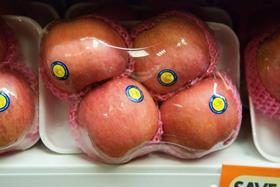
The Fuji apple crop in key growing areas of China’s Shandong Province is shaping up to be very strong this year, with leading packer-marketers reporting increased volumes, larger sizes and better quality compared with last season.
With harvesting just getting under way, Steven Leung of Alfa Fruit Packers told Asiafruit that the coloration of the fruit looks excellent, particularly in the Penglai area, which produces most of the blushed Fuji. The skin finish is also very clean, he said, with very little russeting.
“If the weather conditions hold out for the next few days, we expect this season to produce the best quality we’ve seen in the eight years that we’ve been in the business,” Leung said.
Fruit size also looks far more favourable this year, with a higher percentage of larger fruit, he added. “Last year, almost half the crop was 85mm diameter, with around 30 per cent 80mm and 20 per cent 75mm and smaller,” said Leung. “This year, we expect approximately 25 per cent of the crop to be 85mm, 40 per cent to be 80mm and around 30 per cent to be 75mm and smaller.”
Production volumes are also up, said Leung, who predicted a 20-30 per cent increase on last year.
Rod Hill of Chinese fruit distributor Golden Wing Mau said that reports from the company’s apple suppliers concurred with Leung’s analysis.
 “Fruit collection will get under way in the next few days, and our suppliers are also indicating bigger and better quality fruit than last year,” he said. “They’re projecting a 15-20 per cent increase in crop volumes for Penglai, so slightly more conservative. The only problem remains the price as this is unknown.”
“Fruit collection will get under way in the next few days, and our suppliers are also indicating bigger and better quality fruit than last year,” he said. “They’re projecting a 15-20 per cent increase in crop volumes for Penglai, so slightly more conservative. The only problem remains the price as this is unknown.”
Chinese Fuji prices have increased sharply in the past five years, driven by a range of factors, from increased labour costs to speculation. Whether the increased production volumes will be sufficient to lower those prices significantly remains to be seen.
“We expect the price is going to be a little lower than last year on the medium and small sizes, but the large sizes will be almost the same as last season due to strong domestic demand for large sized apples,” predicted Leung.
Hill said that key apple packer-marketer Penglai Gold Garden had forecast a 15-20 per cent decrease in prices compared with last year.
“Most apple packers and storage operators have been losing money since April/May after paying too much for the fruit last year, so the increased volume available and the difficult end to last season should result in a lower price,” he noted.
Nevertheless, prices from the earlier-bearing growing areas of Shaanxi Province have opened at similar levels to last year, and Hill said there was no guarantee that prices would drop from Shandong.
“One of the problems in Shandong is that there’s excess cold-storage capacity,” he explained. “Also, farmers may have 20-30 per cent more fruit, but they also have to contend with rising costs. Irrespective of crop size, prices have risen consistently for the past six or seven years, so I am not optimistic about the prices.”




